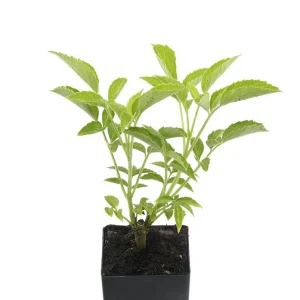Description
Elderflower, the delicate and aromatic blossoms of the elder tree, is a versatile and valuable product with a wide range of uses. These creamy-white flowers have been treasured for centuries for their medicinal properties, culinary applications, and aesthetic appeal in gardens.
Usually available: All year
Life cycle: Perennial
Height: 3 – 4m
Position: Sun / part shade
Soil preference: Well drained
Garden Use
Elderflower is a beautiful addition to any garden, providing a stunning display of large, flat-topped clusters of flowers in late spring to early summer. The elder tree itself is a fast-growing, deciduous shrub or small tree that can reach heights of 4-6 meters. It is well-suited to a variety of garden styles, including cottage, woodland, and wildlife gardens.
Medicinal Use
Elderflower has a long history of medicinal use, dating back to ancient times. It is known for its anti-inflammatory, antiviral, and immune-boosting properties. Elderflower tea or syrup is often used to help alleviate symptoms of colds, flu, and respiratory issues. A study published in the Journal of Functional Foods found that elderflower extract exhibited significant antibacterial activity against several strains of bacteria (Viapiana et al., 2017).
Traditional Uses
In many European countries, elderflower has been used for centuries in traditional medicine and as a flavoring for various foods and beverages. It is believed to have diaphoretic properties, helping to promote sweating and reduce fever. Elderflower is also used in traditional skincare remedies to soothe and brighten the skin.
Culinary Use
Elderflower’s delicate, floral flavor makes it a popular ingredient in various culinary applications. It is commonly used to make elderflower cordial, a refreshing and aromatic syrup that can be diluted with water or added to cocktails. Elderflower is also used to flavor jellies, jams, and baked goods, such as cakes and biscuits.
Other Uses
The elder tree has many other uses beyond its flowers. The berries can be used to make elderberry syrup, which is known for its immune-boosting properties. The wood of the elder tree is prized for its hardness and is used to make small musical instruments, such as flutes and whistles.
In a survival situation, elderflower can be a valuable resource. The flowers can be used to make a tea that may help alleviate respiratory issues and boost the immune system. The berries, when ripe, can be a source of food and can also be used to make a syrup with medicinal properties. The elder tree’s wood can be used for making tools and utensils. Preppers may find value in cultivating elder trees for their diverse range of uses and their hardiness in various growing conditions.
Growing Conditions and Climate
Elderflower is well-suited to growing in many parts of Australia. It prefers a temperate climate and can tolerate a wide range of soil types, although it performs best in well-draining, fertile soil. Elderflower thrives in full sun to partial shade and is relatively drought-tolerant once established. In Australia, it grows well in cool to mild temperate regions, such as Tasmania, Victoria, and parts of New South Wales and South Australia.
Interesting Facts and Gardening Tips
- Elderflower attracts a wide variety of beneficial insects, including bees and butterflies, making it an excellent choice for pollinator gardens.
- The elder tree is fast-growing and can be used as a natural hedge or screen in the garden.
- Elderflower is best harvested in the morning when the flowers are fully open and before the heat of the day.
- Complimentary plants for elderflower include roses, lavender, and herbs such as thyme and rosemary.





Reviews
There are no reviews yet.